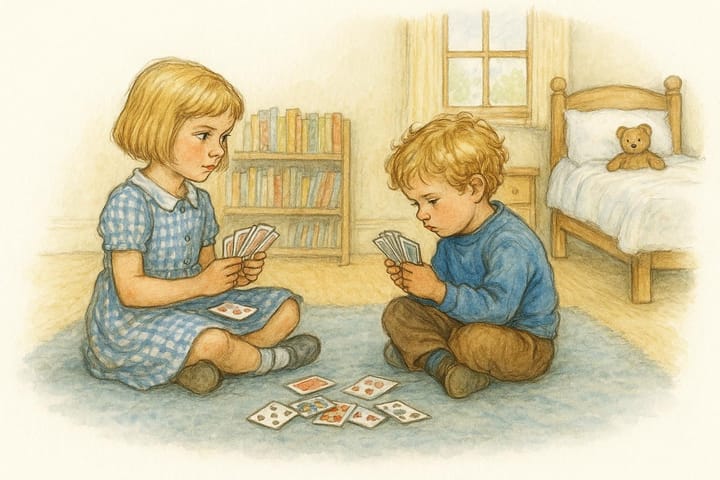Experience blockers: What turns off when screens switch on?
Screen time takes time. Time that could be spent doing something else. Time you won't get back.

Screen time takes time, time that could be spent doing something else. You won't get it back.
Screens are experience blockers.
They stop you becoming the person you could be.
When you watch, you can't play.
And when you can't play, you don't grow.
The emperor of all maladies
Some childhood challenges are obvious - scraped knees, bad dreams, the occasional sulk. These things come and go. But screens? Screens are different.
They creep in, unnoticed at first. Then, suddenly, they dominate everything.
They shape how your child spends her time, how she interacts with the world, how she copes with boredom, frustration, and social struggles.
Siddhartha Mukherjee’s The Emperor of All Maladies describes cancer as the “emperor” of diseases - complex, insidious, and far-reaching. Screens, in their own way, dominate childhood challenges, shaping attention, play, and social development in ways we’re only beginning to understand.
What happens when a screen turns on?
If childhood is preparation for adulthood, screens are a detour, steering your child away from the skills and confidence she needs to grow into her potential.
Before you know it, your child has spent the entire afternoon in front of a screen. She’s been entertained, yes, but what did she actually do?
Now imagine an afternoon without screens. Would she have invented a new game? Made something? Discovered a new passion?
The three biggest experience blockers
When a screen switches on, what turns off?
Play is displaced
Play is how your child learns about the world. It’s where she experiments, problem-solves, and builds independence. But when screens take over, play gets pushed aside.
- A screen means no time for tinkering, inventing, or role-playing.
- It replaces the deep engagement of play with passive consumption.
- It short-circuits boredom, eliminating the chance for creativity to emerge.
Social learning stalls
Screens don’t just block solitary experiences; they disrupt social ones too.
When your child plays with friends or siblings, she learns how to negotiate, compromise, and resolve conflicts. She builds emotional intelligence.
A screen doesn’t demand these skills. It provides entertainment without the need for interaction. Why face the discomfort of making things better after a fight when you can turn to the iPad and disengage?

As a child, I got pretty good at arguing with my sister. When you’re five, this kind of petty bickering comes naturally to most of us. But we always made up quickly. Things are more fun when you do them together, especially when you need that person to be a target for your snowballs!
Boredom gets buried
Boredom is uncomfortable - but it’s also where creativity begins.
Screens eliminate boredom with a tap. But when children never experience boredom, they never learn how to overcome it.
- They don’t develop the ability to entertain themselves.
- They don’t learn how to sit with discomfort and let creativity emerge.
- They don’t build the internal motivation to start something of their own.
A prescription for play
If screens are the emperor of all maladies, what’s the cure?
It’s not more structured activities. It’s not scheduled enrichment or screen-free checklists. It’s the simple, time-tested antidote of childhood itself: play.
- Unstructured play. Time for open-ended, imaginative, self-directed fun.
- Hobbies. Deep, absorbing interests that stretch beyond a single afternoon.
- Fun with friends. Free-flowing, unscripted time to develop social skills and cooperation.
The more your child engages in these, the less she will need screens.
Turning life back on
"If you were to spend time in your room every afternoon, unsupervised", I recently asked my 11-year-old, "how would you spend it if you didn't have screens or access to books? What hobby might you start?"
At first, my question was met with a blank stare.
Hobbies?
My 10-year-old and 7-year-old would have found the question much easier.
- Carry on building my wargaming board.
- Make a sister alarm for my bedroom with my Arduino.
- Write a comic.
- Start a lemonade stand selling my new drink, SourStrike!
- Start a lemonade stand selling my new drink, StrikeRight! It's way better than SourStrike!
But this boy needed a nudge.
So we talked about a recent trip to the Small is Beautiful exhibition in London and how he enjoyed seeing the wonderful miniature worlds. He's never really been interested in crafts but something about the paper buildings on display there inspired him. And so Paper Town was born.
Every day for a week, he came home from school and went straight upstairs to continue making. It didn’t become a long-term interest but for a week he forgot about screens, directed his own play and - best of all - my role was minimal. I didn’t have to think about how to entertain him.
You can't tell your child what to be interested in. It has to come from the heart.
Your job is simply to listen - and to provide the materials, if your child can't gather them herself. And, most importantly, to get out of the way.
Close the door. Go back to the kitchen. Put on the kettle and have a nice cup of tea. Forget about your child and what's best for her. Don't pick up your phone and look for those thermal vests you were going to buy her this week because the weather is turning colder. Do something for yourself. Enjoy it.
Suddenly you look at the clock. It's 7 p.m. and you haven't cooked! But it's OK, because your child didn't realise either. She was so engrossed in her new project that she didn't even notice she was hungry.
It's too late to make anything. A quick slice of peanut butter on toast, a hot chocolate and it's time for bed.
But everyone's happier.
You got a break - and she got a life.
Experience unblocked.
How to get started
If your child struggles to play without screens, start with small changes.
- Introduce a screen-free afternoon. Just a few hours where screens aren’t an option. See what happens.
- Make play the obvious choice. Reduce friction. Make materials accessible. Leave out an unfinished puzzle or a box of craft supplies.
- Expect resistance. At first, your child may flounder. That’s normal. Give her time. It’s not easy to make your own fun when you’re used to being entertained.
- Be patient. One screen-free afternoon won’t transform everything. But over time, your child will rediscover the joy of making, doing, and creating.
Because when screens turn off, the lights of imagination, independence, and play switch on. And that’s an experience worth fighting for.


Comments ()